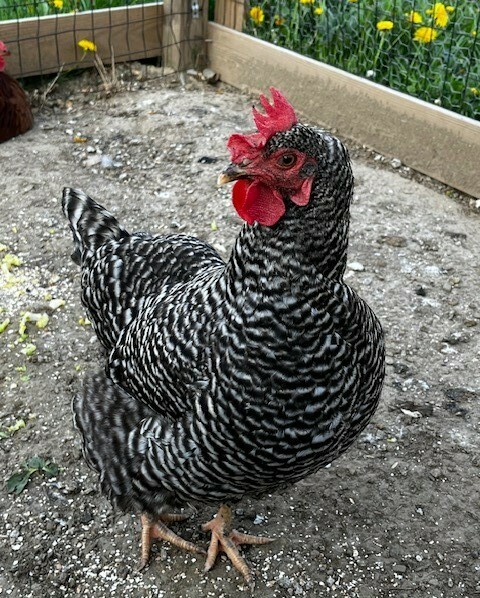 Photo by D. Libertore
Photo by D. Libertore
Picture this: You’re strolling through your backyard, the sun dappling through the trees, the air filled with birds chirping. As you reach your chicken coop, calm washes over you.
With their gentle demeanor and distinctive barred patterns, your Plymouth Rock chickens welcome you with soft clucks and friendly head tilts.
These remarkable dual-purpose birds have been a member of American households for centuries, prized for their productivity and gentle nature.
Intrigued? Great! Join me as I reveal the lives of this beloved breed. We’ll explore their fascinating history and distinctive appearance and discover their exceptional temperament and remarkable productivity.
But wait, there’s more! We’ll also unravel how to care for these birds, ensuring they thrive in your backyard.
Along the way, we’ll meet the seven recognized varieties of Plymouth Rock chickens, each with its unique charm and personality.
So, buckle up and get ready to learn about the Rocks.
A Historical Glimpse into Plymouth Rock Chickens
A Legacy Born from a Blend of Breeds
The Plymouth Rock chicken is an American treasure that traces its roots to the mid-19th century in Massachusetts.
Their story begins with a blend of various breeds, including Dominique, Buff Cochin, and Java. Massachusetts poultry breeder Eben Cobb played a pivotal role in standardizing the breed and popularizing its name, drawing inspiration from the iconic Plymouth Rock landmark.
Plymouth Rock chickens quickly gained recognition for their exceptional qualities, winning over the hearts of farmers and backyard chicken keepers alike.
Their versatility, productivity, and gentle demeanor shot them to the forefront of the poultry industry, earning them the title of the most popular chicken breed in the early 20th century.
A Breed that Embraces Diversity
Plymouth Rock chickens are known for their captivating appearance, with the barred variety being the most recognizable. Their striking black and white barring pattern, reminiscent of a zebra’s stripes, has become synonymous with this breed.
But the Plymouth Rock’s beauty extends beyond its barred plumage. It comes in various colors, including white, blue, buff, Columbian, partridge, and silver penciled varieties.
These plumage variations enhance the visual appeal of Plymouth Rock chickens and contribute to their genetic diversity.
Each variety possesses unique characteristics, appealing to different preferences. Whether you prefer the classic barred pattern or are drawn to the elegance of a white Plymouth Rock, there’s a variety to suit every taste.
A Single Comb that Sets Them Apart
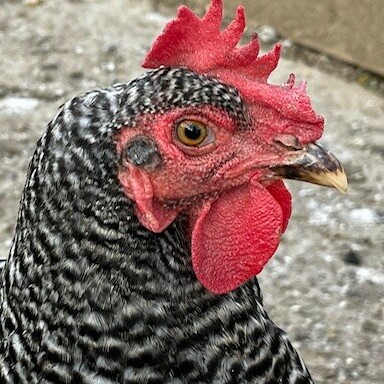
A distinguishing feature of Plymouth Rock chickens is their single comb, a fleshy crest atop their heads. Unlike the double comb found in other breeds, this comb is a single, uninterrupted ridge.
It plays a crucial role in thermoregulation, helping chickens maintain their body temperature in warm and cold climates.
With this in mind, keeping the comb from getting frostbitten is essential. If the Rock loses part of its comb, it loses part of its ability to regulate its body temperature.
The comb also serves as a social signaling device, with its size and color sending signals about a chicken’s health, dominance status, and reproductive readiness.
A healthy, well-nourished Plymouth Rock will have a bright red comb, while a pale or shriveled comb may indicate illness or nutritional deficiencies.
The Gentle Giants of the Chicken Kingdom
A Temperament that Wins Hearts
Plymouth Rock chickens are known for their gentle and docile nature, making them ideal companions for small and large chicken owners.
Their calm demeanor and lack of aggressive tendencies contribute to harmony between chickens and humans.
Whether a child collecting eggs or an adult handling the chickens for routine care, Plymouth Rocks respond with patience and understanding.
This gentle temperament is not merely a coincidental trait. It’s deeply rooted in the breed’s history, a result of careful selection by breeders who sought to create a chicken that was not only productive but also pleasant to be around.
Adapting to Diverse Environments
Plymouth Rock chickens are incredibly adaptable birds, capable of thriving in a wide range of environments.
From the cozy confines of a backyard coop to the vast expanse of commercial farms, they can adjust to different climates and living conditions.
Due to cross-breeding origins, their hardiness stems from a diverse genetic makeup. This genetic diversity has endowed them with the ability to withstand temperature fluctuations, resist common poultry diseases, and forage for food in various environments.
Whether New England’s crisp winters or the South’s scorching summers, Plymouth Rocks can adapt their behavior and physiology to survive and thrive.
That is why you always see them when you drive by a flock of chickens. Not only are they hardy, they catch your eye, too.
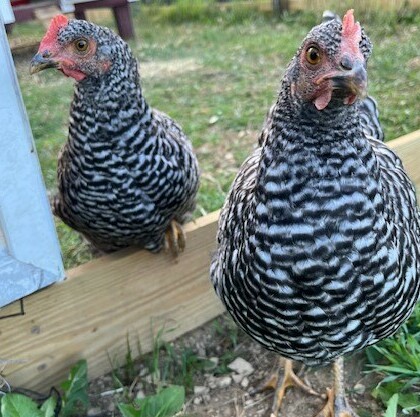
A Friendly Disposition that Enhances the Backyard Experience
Plymouth Rock chickens are not just productive and adaptable; they’re also genuinely friendly companions.
Children are often drawn to their gentle demeanor and love to observe their antics, collect eggs, or admire their feathers.
With their calm and patient nature, Plymouth Rocks tolerate these interactions gracefully, making them ideal companions for families with young children.
Even adults find themselves captivated by the friendly disposition of these remarkable birds. Their presence in the backyard adds a sense of tranquility and connection to nature.
Watching them strut around the coop, peck at the ground, or interact with other chickens provides a welcome respite from the hustle and bustle of everyday life.
Dual-Purpose Excellence: The Productivity of Plymouth Rock Chickens
A Diner’s Delight: The Meat Production Potential of Plymouth Rock Chickens
Plymouth Rock chickens excel in meat production. Their robust physiques and efficient growth rates make them popular for anyone who wants an excellent dual-purpose chicken.
Males can reach up to 9 pounds, while females can reach up to 7 pounds, providing a substantial yield of high-quality meat.
Their meat is known for its tender texture, mild flavor, and versatility in cooking, making it a tasty delight for home cooks.
Plymouth Rock chickens produce excellent meat and do so with remarkable efficiency. Their feed conversion rate to meat is exceptional, making them a cost-effective choice for commercial producers.
This efficiency translates to lower production costs and a more sustainable approach to meat production.
A Staple in the Breakfast Basket: Egg-Laying Prowess of Plymouth Rock Chickens
Plymouth Rock chickens are not just meat producers but also prolific egg layers. Their consistent production of around 200 large brown eggs annually makes them valuable to any backyard flock.
Plymouth Rock chickens maintain their egg-laying productivity throughout the year, even during colder months when other breeds may slow down.
This consistent production makes them a reliable source of fresh eggs for families and commercial producers.
Their dual-purpose nature, combining exceptional meat production with consistent egg-laying capabilities, has cemented Plymouth Rock chickens’ reputation as a versatile and valuable breed.
Creating a Haven for Your Plymouth Rock Chickens
Designing a Coop that Meets Their Needs
Plymouth Rock chickens, like all birds, require a comfortable and secure living environment to thrive. A well-designed coop is essential for their health, well-being, and egg-laying productivity.
The coop should be spacious enough for adequate movement, perching, and nesting. A general rule of thumb is to provide 3-4 square feet of space per chicken.
Proper ventilation is crucial for maintaining air quality and preventing respiratory problems. Ensure the coop has openings that allow fresh air to circulate while protecting the chickens from drafts and extreme weather conditions.
Predator protection is paramount for safeguarding your Plymouth Rock chickens from threats like foxes, raccoons, and hawks.
The coop’s structure should be sturdy and predator-proof, with secure doors and windows that animals cannot easily open.
Additionally, consider surrounding the coop with a predator-proof fence or netting to provide an extra layer of protection.
Ensuring a Balanced Diet for Optimal Health
Like all living organisms, Plymouth Rock chickens require a balanced diet to maintain their health and productivity. Their diet should consist primarily of grains, providing them with carbohydrates, protein, and fiber.
Commercial chicken feed is readily available and formulated to meet their nutritional needs.
However, supplementing their diet with natural food sources can provide additional nutrients and enrichment. Chickens enjoy a variety of greens, such as kale, spinach, and lettuce, as well as fruits like berries and apples.
Grubs, worms, and insects can also be offered as a protein source and a source of entertainment.
Fresh, clean water should always be available to your Plymouth Rock chickens. Water is essential for their bodily functions and egg production. Ensure that waterers are kept clean and free from debris to prevent the spread of diseases.
Maintaining Health and Well-being
Regular check-ups and preventive measures are crucial for maintaining the health and well-being of your Plymouth Rock chickens.
Observe your chickens daily for any signs of illness, such as lethargy, decreased appetite, or changes in droppings. Watch out for consistently runny or bloody droppings, which could indicate problems in the flock.
Vaccinations can protect your chickens from common poultry diseases like Marek’s and Newcastle’s.
Consult with your veterinarian to determine the appropriate vaccination schedule for your flock.
Parasite control is essential for preventing internal and external parasites from affecting your chickens’ health. Regularly deworm your chickens and use appropriate parasite control measures to maintain a healthy environment.
Keeping a first aid kit fully stocked and ready to go at all times is a great idea.
The Seven Recognized Varieties of Plymouth Rock Chickens
Plymouth Rock chickens are not just a single breed; they come in various colors and patterns, each with unique charm and personality. The seven recognized varieties are:
Barred Plymouth Rock: The most recognizable variety, characterized by its alternating black and white barring pattern.
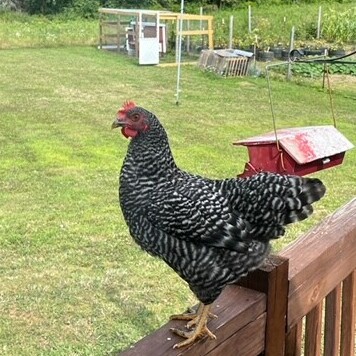 D. Libertore
D. Libertore
White Plymouth Rock: A classic and elegant variety with pure white plumage.
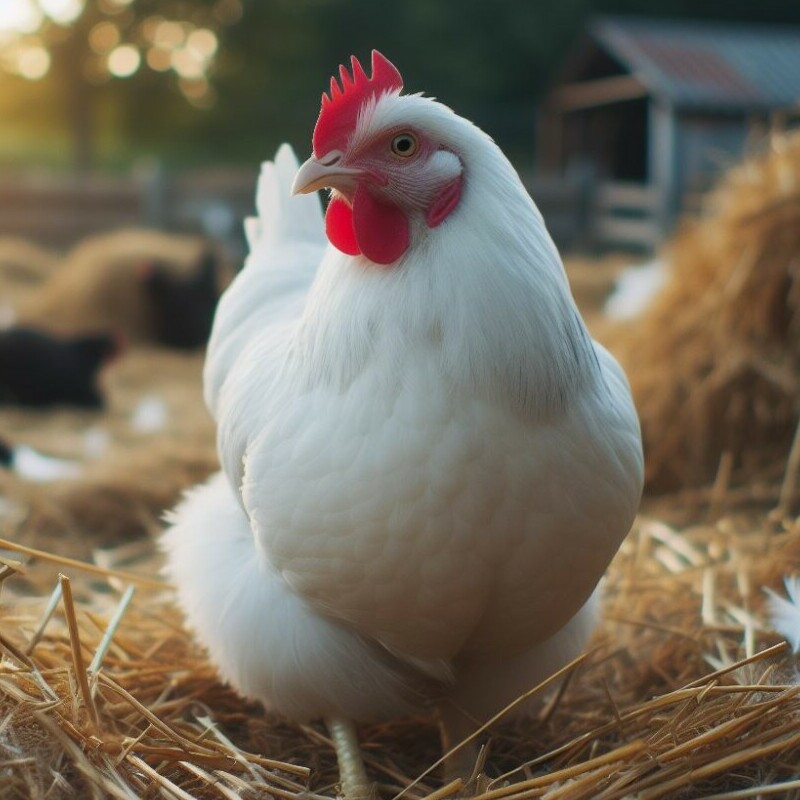
Buff Plymouth Rock: Distinguished by its warm, buff-colored feathers.
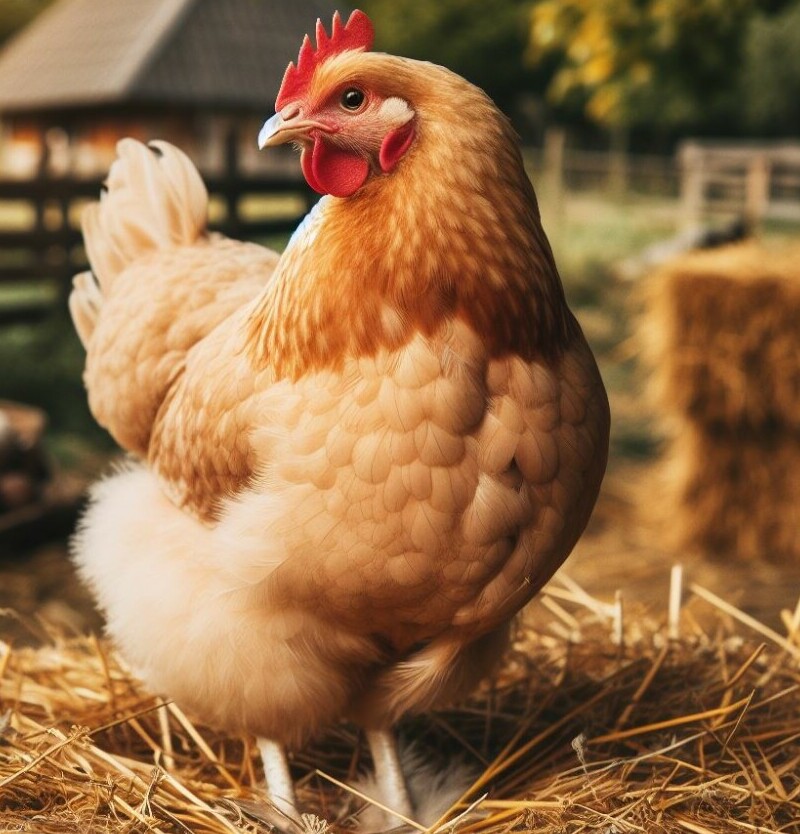
Columbian Plymouth Rock: A striking variety with white plumage and a black tail and neck.
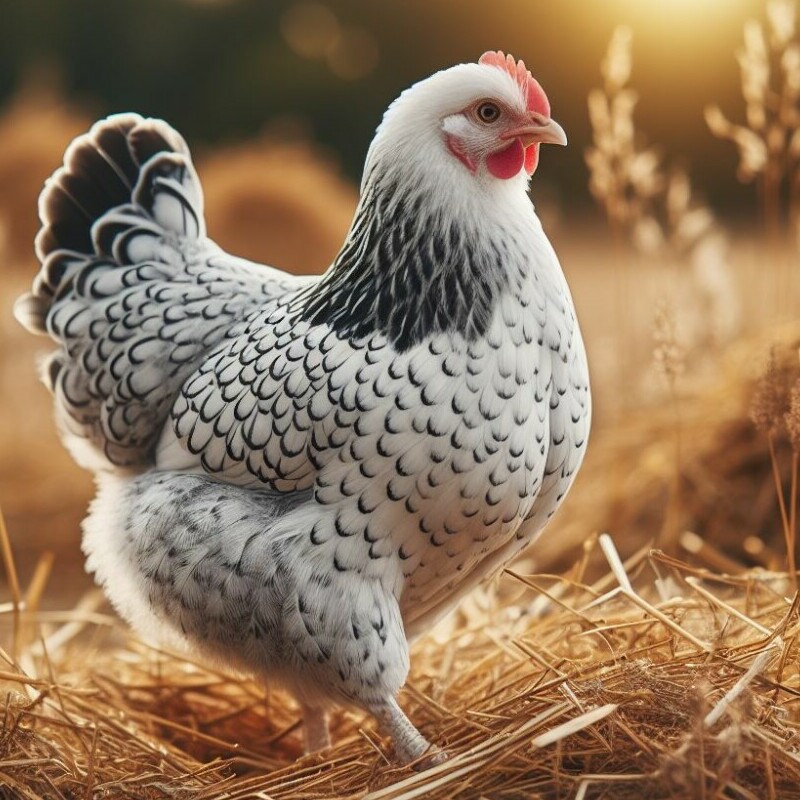
Partridge Plymouth Rock: A rustic and earthy variety with a mix of brown, black, and white feathers.
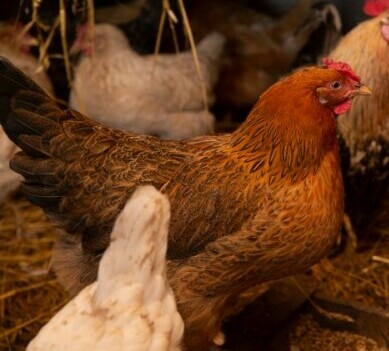
Silver Penciled Plymouth Rock: Characterized by its silvery white feathers with fine black penciling.

Blue Plymouth Rock: A unique and eye-catching variety with a slate blue plumage.

Each variety offers a distinct aesthetic appeal, catering to different preferences and backyard aesthetics. Whether you prefer the classic barred pattern, the elegance of a white Plymouth Rock, or the rustic charm of a partridge variety, there’s a Plymouth Rock chicken to suit every taste.
The Versatility of Plymouth Rock Chickens
Plymouth Rock chickens have firmly established themselves as a popular choice for hobbyists and commercial producers. Their versatility, productivity, and gentle nature make them valuable to any flock.
Backyard Favorites:
For those with only a handful of chickens, Plymouth Rocks are cherished for their friendly demeanor, gentle interactions with children, and consistent egg-laying capabilities.
Their adaptability to various environments makes them suitable for suburban and rural settings.
Commercial Choices:
Commercial producers also recognize the value of Plymouth Rock chickens. Their efficient feed conversion rate, meat production potential, and consistent egg-laying make them a cost-effective and productive choice for large-scale operations.
Their hardiness and resilience allow them to thrive in commercial settings, even under intensive management practices.
Plymouth Rock chickens’ dual-purpose nature, combining exceptional meat production with reliable egg-laying, has made them a staple in the poultry industry.
Their versatility, adaptability, and gentle demeanor earned them a place in backyard coops and commercial farms, solidifying their position as one of the most beloved and enduring chicken breeds.
Unique Qualities of Plymouth Rock Chickens
Their Foraging Prowess: Enhancing Sustainability
Plymouth Rock chickens are not just efficient feed converters; they are also skilled foragers. Their ability to search for and consume natural food sources, such as grubs, worms, insects, and greens, supplements their diet and reduces their reliance on commercial feed.
This foraging prowess contributes to a more sustainable approach to chicken raising, reducing the environmental impact of feed production and waste.
In commercial settings, their calm demeanor can positively impact egg production and meat quality. Stressed chickens may experience reduced egg-laying and produce meat with less desirable characteristics.
By minimizing stress, Plymouth Rock chickens maintain their productivity and contribute to the quality of the final product.
A Legacy that Endures: The Enduring Popularity of Plymouth Rock Chickens
A Century of Dominance: The Early 20th Century Rise
With their exceptional qualities and versatility, Plymouth Rock chickens quickly gained recognition and popularity in the early 20th century.
By 1910, they had become the most popular chicken breed in the United States, surpassing the established favorites like the Rhode Island Red and the Leghorn.
Adapting to Changing Times: Enduring Popularity in the Modern Era
Despite introducing new breeds and the changing landscape of the poultry industry, Plymouth Rock chickens have maintained their enduring popularity.
Plymouth Rock chickens remain prevalent in today’s backyard chicken movement due to their friendly demeanor, consistent egg-laying, and manageable size.
A Treasured Breed with an Enduring Legacy
With their dual-purpose excellence, gentle nature, and enduring popularity, Plymouth Rock chickens have rightfully earned their place as a treasured breed in the poultry world. Their ability to adapt to various environments, consistent productivity, and friendly demeanor have made them a beloved choice.
As we look towards the future of poultry raising, Plymouth Rock chickens are poised to continue their legacy. Their versatility, adaptability, and gentle nature will continue to make them a valuable addition to flocks worldwide, ensuring they remain a cherished part of the poultry industry for generations.
Thanks for reading. I truly appreciate it! If you have any “Rock” stories you would like to share, please leave them below.
Dave
Chickenmethod.com

